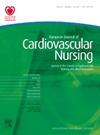评估冠状动脉综合征患者的二级预防知识
IF 3.9
3区 医学
Q2 CARDIAC & CARDIOVASCULAR SYSTEMS
引用次数: 0
摘要
背景/简介 患者教育是冠状动脉综合征患者护理的重要组成部分。护理工作在预防疾病和促进健康方面发挥着重要作用。半数以上的冠心病患者对冠心病的认识有限,这与他们对改变生活方式的决心不足、住院次数增加和死亡风险较高有关。护士的核心能力是在预防性护理中促进、维护和恢复个人健康。知识评估可帮助护士规划教育策略,满足患者的信息需求,为二级预防提供有效支持。目的 (1) 评估冠状动脉综合征患者的二级预防知识;(2) 比较年龄为 60 岁和 60 岁以上两组患者的知识水平。方法 这是一项针对冠状动脉综合征住院患者的横断面研究。采用冠状动脉疾病教育问卷(CADE-Q II)评估知识水平。CADE-Q II 有 31 个项目,4 个可能的答案。问题涉及健康状况、风险因素、运动、营养和社会心理风险。最高分为 93 分,分数越高表示知识越丰富。对 CADE-Q II 进行了描述性分析。分析采用 SPSS 22 版,所有检验的显著性水平均定为 0.05。所有项目均无缺失。结果 共纳入 155 名患者;平均年龄(58.26±8.37)岁;22 % 为女性;78 % 为男性;56 % 为 60 岁;44 % 为 60 岁;71 % 为高血压患者;22 % 为糖尿病患者;32 % 为吸烟者。参与者的平均知识得分为 61.4/93。患者在以下方面的答案完全正确:健康状况 55%;风险因素 47%;运动 64%;营养 50%;社会心理风险 64%。根据获得的分数,知识水平为:很好 0 %;好 37 %;可以接受 55 %;差 7 %;不足 1 %。在各年龄组中,我们得出了具有统计学意义的结果:60 岁患者的得分为 63.2/93;60 岁患者的得分为 59.0/93(P=0.012);在运动方面,年龄为 60 岁的患者得分为 16.5/21;年龄为 60 岁的患者得分为 13.9/21(P=0.001);在社会心理方面,年龄为 60 岁的患者得分为 10.9/15;年龄为 60 岁的患者得分为 9.7/15(P=0.034)。结论 研究结果表明,冠状动脉综合征患者对自己的疾病和影响心血管风险的因素在所有研究领域的了解程度较低。在冠状动脉综合征患者中使用评估工具可以让护士规划教育过程,为预防工作提供有效支持。为患者提供充足的信息、提高其健康素养是预防和尽量减少风险因素的重要组成部分。在护理过程中,护士应使用 CADE-Q II 来宣传有关保护心脏的生活方式的知识和态度。本文章由计算机程序翻译,如有差异,请以英文原文为准。
Evaluation of secondary prevention knowledge in patients with coronary syndrome
Background/introduction Patient education is a crucial component in the care of patients with coronary syndrome. Nursing has an important role in disease prevention and health promotion. More than half of patients with coronary artery disease have limited knowledge which is associated with low commitment to lifestyle modification, increased hospitalizations and higher risk of mortality. The core competencies of the nurses is to promote, maintain, and restore the health of individuals in preventive care. Knowledge assessment can support nurses to plan educational strategies to address the information needs of their patients, providing effective support in secondary prevention. Purpose (1) To assess secondary prevention knowledge in patients with coronary syndrome and (2) to compare knowledge levels among groups of patients aged <60 years and aged >60 years. Methods This was a cross-sectional study of hospitalised patients with coronary syndrome. The Coronary Artery Diseases Education Questionnaire (CADE-Q II) was used to evaluate knowledge. CADE-Q II has 31 items with 4 possible answers. Questions are related to health status, risk factors, exercise, nutrition, and psychosocial risk. The maximum score is 93, with higher scores indicating greater knowledge. Descriptive analysis of the CADE-Q II was performed. SPSS Version 22 was used for analysis, and the level of significance was set at 0.05 for all tests. No items were missing. Results We included 155 patients; mean age 58,26±8,37; 22 % female; 78 % male; 56 % < 60 years old; 44 % > 60 years old; 71 % hypertension; 22 % diabetes; 32 % smokers. Mean knowledge score of participants was 61,4/93. Patients obtained values of completely correct answers in the following areas: health status 55 %; risk factors 47 %; exercise 64 %; nutrition 50 %; psychosocial risk 64 %. The level of knowledge based on the scores obtained: great 0 %; good 37 %; acceptable 55 %; poor 7 %; inadequate 1 %. Within the age groups, we obtained statistically significant results, patients aged <60 years got score 63,2/93; patients aged >60 years got score 59,0/93 (p=0.012); in the exercise domain, patients aged <60 years got score 16,5/21; patients aged >60 years got score 13,9/21 (p=0.001); in the psychosocial domain, patients aged <60 years got score 10,9/15; patients aged >60 years got score 9,7/15 (p=0.034). Conclusion The results of study point to a lower of knowledge of patients with coronary syndrome regarding their disease and factors affecting cardiovascular risk in all studied domains. The use of an assessment tool in patients with coronary syndrome allows nurses to plan educational process, providing effective support in prevention. Adequate information, promotion of health literacy of patients are an essential part of prevention and minimization of risk factors. Nurses during the nursing process by using CADE-Q II ought to promote knowledge and attitudes towards cardioprotective lifestyle.
求助全文
通过发布文献求助,成功后即可免费获取论文全文。
去求助
来源期刊

European Journal of Cardiovascular Nursing
CARDIAC & CARDIOVASCULAR SYSTEMS-NURSING
CiteScore
5.10
自引率
10.30%
发文量
247
审稿时长
6-12 weeks
期刊介绍:
The peer-reviewed journal of the European Society of Cardiology’s Council on Cardiovascular Nursing and Allied Professions (CCNAP) covering the broad field of cardiovascular nursing including chronic and acute care, cardiac rehabilitation, primary and secondary prevention, heart failure, acute coronary syndromes, interventional cardiology, cardiac care, and vascular nursing.
 求助内容:
求助内容: 应助结果提醒方式:
应助结果提醒方式:


